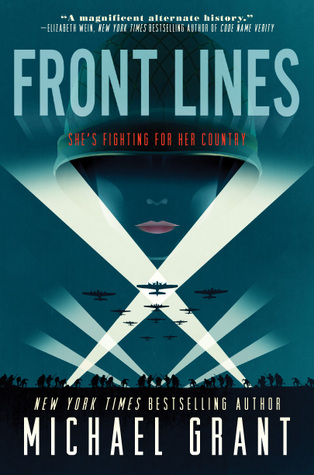This book is a true alternate history book: no magic, no paranormal, just what would be historical fiction except that a huge change has been made. In this case, the huge change to history is that the Supreme Court has allowed women to be enlist/ be drafted into WWII.
I found this change to be a very timely thing, as the actual possibility of women's registering for the draft sometime in the near future has recently been suggested (and thrown conservative news comments sections into a tizzy). I really liked how Grant presented the obvious but often overlooked fact that many girls/women simply wouldn't have the physical strength necessary to make it into combat anyway. In Front Lines, this is made very clear.
The book has three main protagonists whose stories weave together. Each girl is very well drawn out as a character, as are the personalities of the supporting characters. I felt this was a real strong point in the book.
I also loved how the main military conflicts followed were all set in Tunisia. It's easy to find historical fiction set in Europe during the War, not so much so with the Pacific Theatre, but Africa? I'd never heard of a book's covering that part of the War before.
Grant seems to have done quite a bit of research. True, I'm no expert, but I was delighted to read a supporting character's description of the Pacific war hero, General Douglas MacArthur. On page 231, Grant has a character say, "The general... well, I shouldn't say it, but he's a pompous ass and a showboat...." I've never read such a thing in print --ever! But my father, who fought with the unit temporarily assigned to protect MacArthur, has spent 70 years making fun of the general for staging photo shoots in perfectly pressed trousers weeks after the battles were over. (In those days, there was no instant sharing of pics, so the public was more easily fooled.)
I really liked this book, and I would have given it five stars, but the end is ... lame.
Grant gets us through the battle, lets us know who made it out alive, and then he just stops. Not even one of the numerous subplots is resolved. The narrator never identifies herself (or possibly himself), which is even more aggravating that the protagonists with no names in The Invisible Man and Rebecca. I'm guessing this is a set up for a sequel, but since the book begins and ends with teasers at the end of the war, it all just feels wrong. And cheap. It's as if Grant thought, "Oh, the book's getting too long; I'll just stop here." Boo! Hiss!
Other irritating things include: 1) the book is written in present tense, which is SO ANNOYING, 2) Grant uses "fug" for the F-word throughout the book and "Nigra" for the N-word -- which makes his tone condescending (there are other ways to let readers know what's been said without actually printing the words, if he's concerned about losing his YA readers or making their mommies mad), and 3) in spite of Grant's attempt to be all trendy and cool by writing female protagonists, it's clear he's Mr. Macho Male and too squeamish to deal with the major problem a girl in fighting situations would have: menstruation. (Kotex and Tampax would have been wondrous and new to country girls entering the army, but pads were held in place with garter-like belts. Girls would worry about rashes, smells, disposal, leaks, cramps, etc. This would have been huge! Grant's characters appear not to menstruate so that he doesn't have to mention "icky" things in a book which includes headless corpses and intestines spilling out. *rolls eyes*)
On the whole, however, this is a very good read, and I enjoyed it.

No comments:
Post a Comment